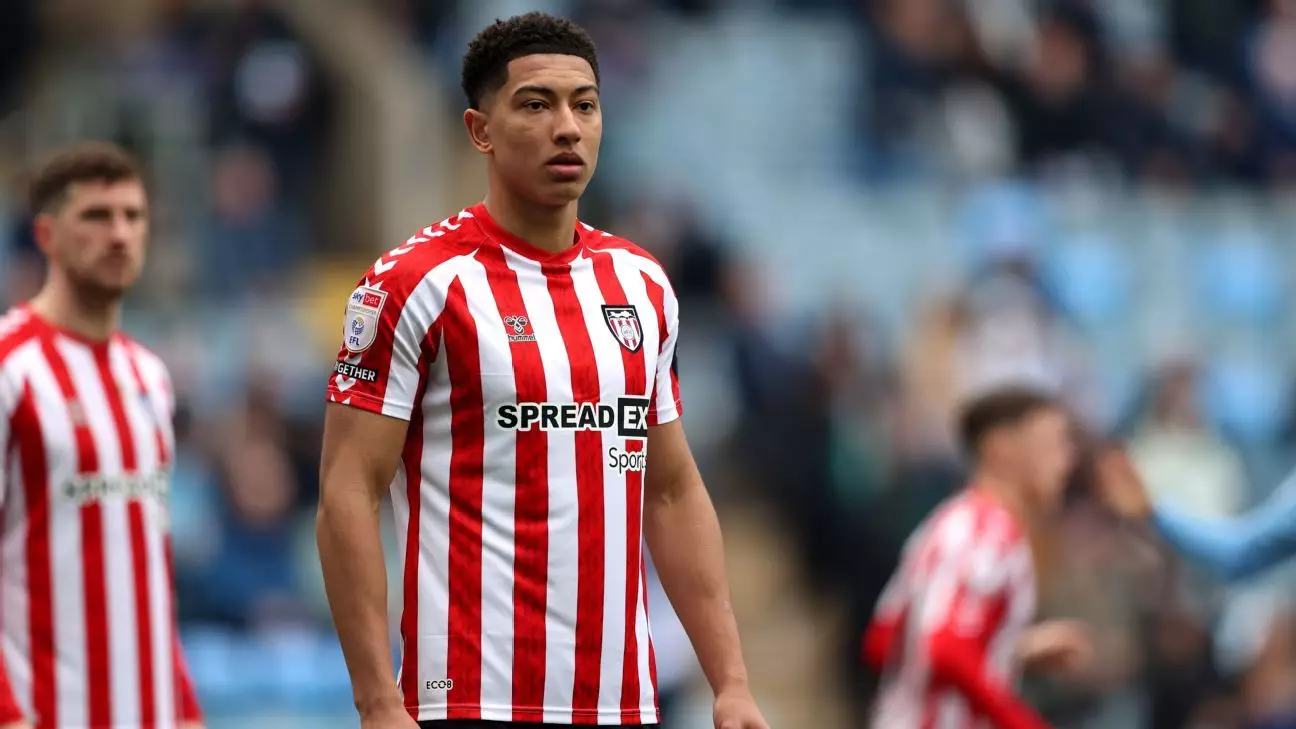As the football transfer window looms, rumblings of potential deals have begun to intensify, especially surrounding young talents like Jobe Bellingham. The 19-year-old midfielder currently plying his trade at Sunderland has reportedly caught the attention of Bundesliga powerhouse RB Leipzig. Unlike many of his peers, Bellingham has already commanded attention both for his performance on the field and his surname, being the brother of the illustrious Jude Bellingham. A key point to note is that while Leipzig has initiated discussions regarding Bellingham, they face resistance due to Sunderland’s high valuation. This situation underscores the complexities of young talent transfers, as clubs often struggle to balance a player’s ability and potential against financial expectations.
Bellingham’s rising profile signals a strategic shift in player acquisition philosophies across top European leagues. Instead of merely purchasing established stars, clubs are increasingly investing in young players who possess the raw potential to blossom into next-level performers. In Bellingham’s case, his departure from Sunderland appears almost inevitable, with speculation surrounding the likes of Chelsea, Manchester United, and Arsenal feeding into the narrative. Rather than a mere transfer, this could be seen as a crucial step in Bellingham’s development as a player—and an opportunity for Sunderland to cash in on their investment before the player’s value increases further.
Tottenham’s Bold Move for Angel Gomes
Across the Channel, Tottenham Hotspur is reportedly leading the pursuit of Lille midfielder Angel Gomes. At just 24 years old, Gomes has proven to be an effective playmaker, and several clubs are keen to secure his services as he approaches free agency. This scenario speaks volumes about the evolution of player contracts and the dynamics of negotiation power. Tottenham’s interest is compelling but highlights a strategic consideration on their part: Gomes’s fit within manager Ange Postecoglou’s tactical schema could be transformative.
This transition from other clubs to Tottenham is emblematic of the larger shift happening in the Premier League—where clubs prepared to adapt their systems to leverage the skill sets of available players may find themselves at a competitive advantage. Gomes’s rejected pre-contract with West Ham only strengthens Spurs’ position, making them the sought-after destination for a player who could inject creativity into midfield. The potential arrival of Gomes could indeed bolster Tottenham’s aspirations for the coming season, particularly in the wake of fluctuating performances in recent campaigns.
Chelsea’s Pursuit of Nico Williams
In the ever-competitive landscape of Premier League transfers, Chelsea’s approach towards Athletic Club winger Nico Williams demonstrates a calculated risk that could pay off immensely. At just 22 years old, Williams represents the kind of youthful dynamism that champions crave; however, his market standing is tightly intertwined with Chelsea’s hope for Champions League qualification. The pressure is mounting for Chelsea, not just to secure a spot in Europe’s elite competition but to capitalize on emerging talents who can enhance their squad depth.
Williams is not merely a passing interest; enhancing Chelsea’s attacking capability could make a profound impact on their season outcomes. Given the simultaneous interest from other giants such as Liverpool, Arsenal, and Tottenham, the Blues are under a tight deadline to close this deal. Williams’s speed, technical ability, and youthful exuberance make him a coveted asset—not just for Chelsea, but for any team looking to alter their attacking play fundamentally.
Struggles in Turin: Dusan Vlahovic’s Future
Meanwhile, in Italy, Juventus faces a precarious situation concerning striker Dusan Vlahovic. The lack of progress in contract negotiations hints at unrest within the ranks, raising questions about Vlahovic’s commitment to the Bianconeri. With nine goals in 22 Serie A appearances this season, the Serbian international’s talent is unquestionable, but recent indications suggest that neither party is keen on extending their association. Herein lies a lesson on the negotiations behind the scenes—no matter the player’s caliber, a lack of mutual interest can spell the end of an era.
Vlahovic’s future could be a double-edged sword. On one hand, his potential exit provides Juventus with the opportunity to refresh and reinvigorate their squad; on the other, it poses risks associated with replacing a high-impact player. The prospect of a transfer away from Juventus will undoubtedly heighten interest from clubs such as Arsenal, who previously showed interest in January, highlighting the unpredictable nature of transfer targets and the strategic chess game played by clubs across Europe.
A Hotbed of Potential Moves
The transfer market is not merely a reflection of player values and club ambitions; it embodies the complex interplay of talent, timing, and tactical fit. As clubs evaluate their needs for the upcoming seasons, they find themselves engaged in a delicate dance of negotiations and interests, each striving to carve out advantages for themselves. The shifting dynamics observed in the cases of Bellingham, Gomes, Williams, and Vlahovic signal a compelling narrative that will undoubtedly unfold in the coming months. The anticipation surrounding these potential transfers reflects a broader trend within football—a commitment to blending the old with the new and a willingness to adapt and evolve in a fiercely competitive environment.
